
The history of Zambia experienced many stages from colonisation to independence from Britain on 24 October 1964. Northern Rhodesia became a British sphere of influence in the present-day region of Zambia in 1888, and was officially proclaimed a British protectorate in 1924. After many years of suggested mergers, Southern Rhodesia, Northern Rhodesia, and Nyasaland were merged into the British Federation of Rhodesia and Nyasaland.
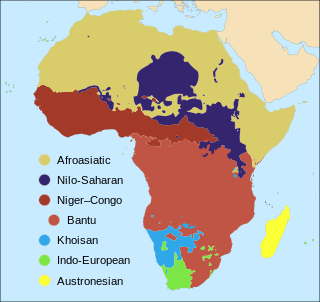
The number of languages natively spoken in Africa is variously estimated at between 1,250 and 2,100, and by some counts at over 3,000. Nigeria alone has over 500 languages, one of the greatest concentrations of linguistic diversity in the world. The languages of Africa belong to many distinct language families, among which the largest are:

Lingala is a Bantu language spoken in the northwest of the Democratic Republic of the Congo, the northern half of the Republic of the Congo, in their capitals, Kinshasa and Brazzaville, and to a lesser degree as a trade language or because of emigration in neighbouring Angola or Central African Republic. Lingala has 20 million native speakers and about another 20 million second-language speakers, for an approximate total of 40 million speakers. A significant portion of both Congolese diasporas speaks Lingala in their countries of immigration like Belgium, France or the United States.
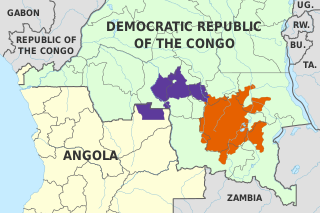
Luba-Kasai, also known as Cilubà or Tshilubà, Luba-Lulua, is a Bantu language of Central Africa and a national language of the Democratic Republic of the Congo, alongside Lingala, Swahili, and Kikongo ya leta.

The culture of Angola is influenced by the Portuguese. Portugal occupied the coastal enclave Luanda, and later also Benguela, since the 16th/17th centuries, and expanded into the territory of what is now Angola in the 19th/20th centuries, ruling it until 1975. Both countries share prevailing cultural aspects: the Portuguese language and Roman Catholicism. However, present-day Angolan culture is mostly native Bantu, which was mixed with Portuguese culture. The diverse ethnic communities with their own cultural traits, traditions and native languages or dialects include the Ovimbundu, Ambundu, Bakongo, Chokwe, Avambo and other peoples.

Lunda Sul is a province of Angola. It has an area of 77,637 km2 and a 2014 census population of 537,587. Saurimo is the provincial capital.

Moxico or Moshiko is the largest province of Angola. It has an area of 223,023 square kilometres (86,110 sq mi), and covers 18% of the landmass of Angola. The province has a population of 758,568 and a population density of approximately 3.4 residents per km2, making it one of the most sparsely populated areas of Angola. The population of the province is in flux; displaced residents have slowly returned to Moxico since the end of the Angolan Civil War in 2002. The war left Moxico as one of the most landmine-contaminated places in the world. The governor of the province is Gonçalves Manuel Muandumba.
Lunda, also known as Chilunda, is a Bantu language spoken in Zambia, Angola, and, to a lesser extent, in the Democratic Republic of the Congo (DRC). Lunda and its dialects are spoken and understood by perhaps 8.6% of Zambians, and the language is used mainly in the Northwestern province of Zambia. The majority of the Lunda can be found in DRC, especially Katanga Province, as well as in Angola. A small number of Lunda dialects are represented in Namibia.
Lu(u)nda or Ruund may refer to:
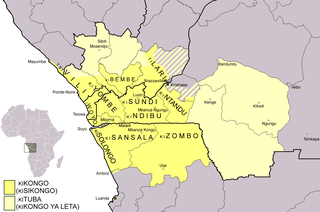
Kongo or Kikongo is one of the Bantu languages spoken by the Kongo people living in the Democratic Republic of the Congo (DRC), the Republic of the Congo, Gabon, and Angola. It is a tonal language. The vast majority of present-day speakers live in Africa. There are roughly seven million native speakers of Kongo in the above-named countries. An estimated five million more speakers use it as a second language.
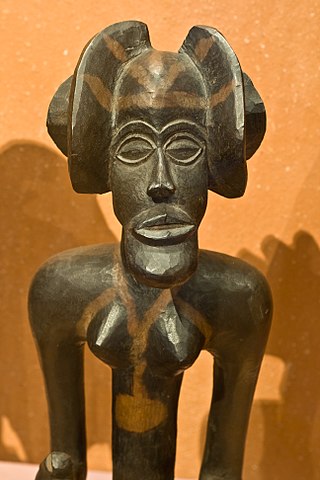
The Chokwe people, known by many other names, are a Bantu ethnic group of Central and Southern Africa. They are found primarily in Angola, southwestern parts of the Democratic Republic of the Congo, and northwestern parts of Zambia.

Kimbundu, a Bantu language which has sometimes been called Mbundu or North Mbundu, is the second-most-widely-spoken Bantu language in Angola.
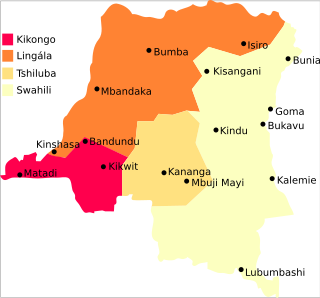
The Democratic Republic of the Congo is a multilingual country where an estimated total of 242 languages are spoken. Ethnologue lists 215 living languages. The official language, since the colonial period, is French, one of the languages of Belgium. Four other languages, all of them Bantu based, have the status of national language: Kikongo-Kituba, Lingala, Swahili and Tshiluba.

Portuguese is the only official language of Angola, but 46 other languages are spoken in the country, mostly Bantu languages.
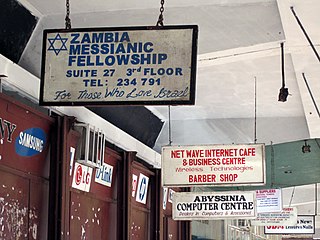
Zambia has several major indigenous languages, all members of the Bantu family, as well as Khwedam, Zambian Sign Language, several immigrant languages and the pidgins Settla and Fanagalo. English is the official language and the major language of business and education.
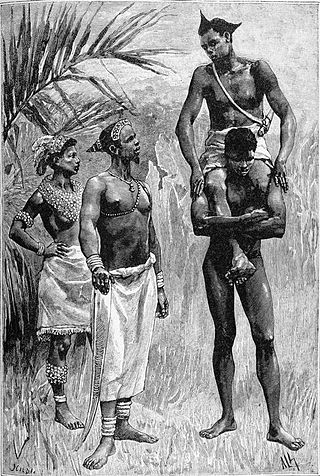
The Lunda are a Bantu ethnic group that originated in what is now the Democratic Republic of the Congo along the Kalanyi River and formed the Kingdom of Lunda in the 17th century under their ruler, Mwata Yamvo or Mwaant Yav, with their capital at Musumba. From there they spread widely through Katanga and into Eastern Angola, north-western Zambia and the Luapula valley of Zambia.
Xá-Muteba or Shah-Muteba is a town and municipality in Lunda Norte Province in Angola. The municipality had a population of 68,114 in 2014.
Luvale is a Bantu language spoken by the Lovale people of Angola and Zambia. It is recognized as a regional language for educational and administrative purposes in Zambia, where about 168,000 people speak it as of 2006. Luvale uses a modified form of the latin alphabet in its written form.
Mbunda is a Bantu language of Angola and Zambia. There are several dialects: Katavola, Yauma, Nkangala, Mbalango, Sango, Ciyengele ("Shamuka"), and Ndundu, all of which are closely related. Mbunda was one of six languages selected by the Instituto de Línguas Nacionais for an initial phase to establish spelling rules in 1980 to facilitate teaching in schools and promoting its use.













